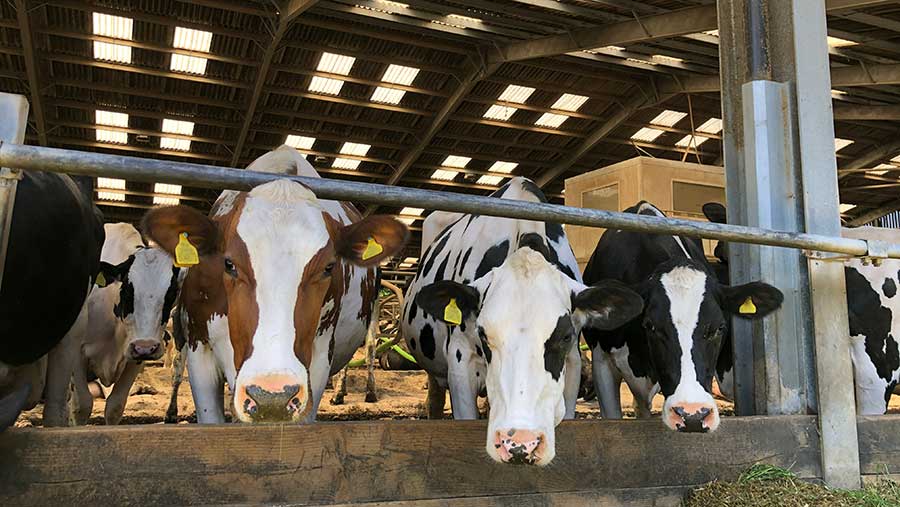Rape-for-soya swap cuts dairy emissions by 8.6%, study finds
 © A Linscott/Adobe Stock
© A Linscott/Adobe Stock Swapping soya for rapeseed meal in dairy diets cut the milk carbon footprint by 8.6% on a college farm.
Staff at Duchy College, Stoke Climsland, Cornwall, lowered emissions by 80g/litre carbon dioxide equivalent (CO2e) with the diet change in a two-year EU-funded trial.
See also: More processors announce milk price cuts for May
The study
The study looked at two groups of 62 cows within the 196-head Duchy College farm.
Cows were balanced by parity and predicted milk yield, were milked twice a day, and fed five times daily using an automated robotic feeding system.
The medium-yielding mainly Holstein herd, averaged 8,800 litres a cow when the trial was carried out. Cows are rotationally grazed in summer, typically for seven months.
The diet (see “Feeding plan for Duchy College Carbon study”) compared performance on cows given 6.25kg of a 23% crude protein soya blend (5.48kg dry matter) and 6.25kg of a 23% crude protein rapeseed meal product (5.49% dry matter).
Feeding plan for Duchy College Carbon study |
||
|
Feed |
Freshweight (kg) |
Dry matter (kg) |
|
Maize silage |
25 |
7.7 |
|
Silage fourth-cut |
14 |
3.9 |
|
Silage first-cut |
10 |
2.8 |
|
Mineral 400g |
0.4 |
0.391 |
|
18% cake |
10.5 |
9.1 |
|
Actual intake |
66.2 |
29.4 |
Concentrate blends were formulated with or without soya, with equivalent levels of crude protein, metabolisable energy and fibre.
Where soya was excluded from blends, rapeseed meal was used instead.
Paul Ward of Duchy College said yield, milk quality and cow condition scores were unaffected by the diet change.
Mr Ward added: “Assuming the herd was making progress on other measures such as improved fertility, first-calving optimisation, better health and use of home-grown protein, total carbon footprint would fall by 10%.
“But long-term research is needed to confirm these estimates.”
Funding came from the European Regional Development Fund, with £440,000 supporting the project and Cornwall Council receiving £140,600 as part of the Agriculture bas Carbone for Dairy farms (ABCD) project.
Popular topic
In a further knowledge exchange initiative, the project oversaw a farmer exchange between Cornwall and Brittany in the summer of 2022.
Gaid Carval, economic growth officer at Cornwall Council, said: “We were aiming to reach as many farms as possible and support them in transitioning to low-carbon practices.
“A survey carried out by ABCD early in the project revealed that ‘how to complete a carbon footprint’ was the most popular training requirement topic in relation to carbon management (56%). Manure and fertiliser management came second (51%) and soil management third (43%).”
